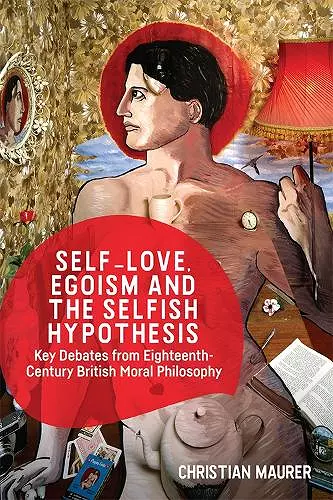Self-love, Egoism and the Selfish Hypothesis
Key Debates from Eighteenth-Century British Moral Philosophy
Format:Hardback
Publisher:Edinburgh University Press
Published:3rd Apr '19
Currently unavailable, and unfortunately no date known when it will be back

The dawn of the Enlightenment saw heated debates on self-love. Do people only act out of self-interest? Or is there a less pessimistic explanation for human behaviour? Maurer delves into the contributions to these debates from both famous and lesser known authors, including Lord Shaftesbury, Bernard Mandeville, Francis Hutcheson, Joseph Butler, Archibald Campbell, David Hume and Adam Smith, and puts them in their philosophical, theological and economic context. Maurer identifies five distinct conceptions of self-love and looks at their role within theories of human psychology and morality while drawing attention to the heuristic limits of our contemporary notion of egoism. He compares the central arguments and the different strategies intended to morally rehabilitate human nature and self-love before and during the Enlightenment.
A great virtue of Christian Maurer’s Self-Love, Egoism, and the Selfish Hypothesis is to disambiguate five senses of self-love in eighteenth-century discussions. ‘Self-love’ and its synonyms variously refer to (1) egoistic desire, (2) love of praise, (3) self-esteem, (4) amour propre and (5) self-respect. Maurer uses these ideal types forensically to provide a better understanding of what is being debated by whom and why … All scholars of early modern moral philosophy will benefit from reading this book and will think about the debates over self-love differently after having read it. -- Aaron Garrett, Boston University * Journal of the History of Philosophy *
Christian Maurer's book is both exciting and scholarly. It offers revisionist readings of philosophers such as Hume, Butler and Mandeville, and of central themes in moral psychology, including self-love. Maurer combines the argumentative rigour of philosophy with the nuance and contextual sensitivity of intellectual history. This work is an outstanding achievement. -- Colin Heydt, University of South Florida
This book provides a developed conceptual analysis of the term ‘self-love’ as used by a number of major and less-known philosophers engaged in this central debate of the time. Maurer's attention to the various meanings of this term provides a useful guide for navigating the development of this dialogue, including the shift to many views that take self-love to be compatible with or even essential for virtue. The book also successfully distinguishes commitments to self-love as a natural motivation from commitments to the selfish hypothesis. The reader gains a clearer sense of the central claims these philosophers were debating, as well as the conceptual and cultural challenges they faced in endorsing them. This book will be of interest to anyone looking to get beyond a superficial understanding of these key figures’ moral and psychological commitments, and despite its brevity and broad scope, it is rich enough to engage those who study these figures individually and to open new avenues of interpretation. -- Erin Frykholm, University of Kansas * Journal of Scottish Philosophy *
Maurer has produced an admirable book that explores a neglected topic without sacrifice of detail or verve. -- Eugene Heath, State University of New York * Eighteenth-Century Scotland *
In placing emphasis on both arguments for the reality of benevolence and arguments for the moral value of self-love, Maurer makes a significant contribution to our understanding of the so-called “British moralists” … An excellent book. It is well-written, thoroughly researched, and intellectually adventurous. Anyone working on the moral philosophy and moral psychology of 18th-century philosophy will need to read it. -- James A. Harris, University of St. Andrews * Intellectual History Review *
ISBN: 9781474413374
Dimensions: unknown
Weight: 504g
240 pages